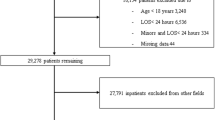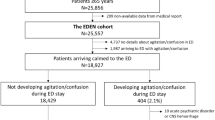Abstract
OBJECTIVE: To identify clinical characteristics associated with inpatient development of delirium tremens so that future treatment efforts can focus on patients most likely to benefit from aggressive therapy.
DESIGN: Retrospective cohort study among patients discharged with diagnoses related to alcohol abuse.
SETTING: University-affiliated inner-city hospital.
PATIENTS/PARTICIPANTS: Two hundred consecutive patients discharged between June 1991 and August 1992 who underwent evaluation and treatment for alcohol withdrawal or detoxification.
MEASUREMENTS AND MAIN RESULTS: Mean age was 41.9 years, 85% were male, 57% were white and 84% were unmarried. Forty-eight (24%) of the patients developed delirium tremens during hospitalization. Bivariate analysis indicated that those who developed delirium tremens were more likely to be African-American, unemployed, and homeless, and were more likely to have gone more days since their last drink, and to have concurrent acute medical illness, high admission blood urea nitrogen level and respiratory rate, and low admission albumin level and systolic blood pressure. In multiple logistic regression analyses, patients who developed delirium tremens were more likely to have gone more days since their last drink (odds ratio [OR] 1.3; 95% confidence interval [CI] 1.09, 1.61) and to have concurrent acute medical illness (OR 5.1; 95% CI 2.07, 12.55). These risk factors were combined for assessment of their ability to predict the occurrence of delirium tremens. If no factors were present, 9% developed delirium tremens; if one factor was present, 25% developed delirium tremens; and if two factors were present, 54% developed delirium tremens.
CONCLUSIONS: Inpatient development of delirium tremens was common among patients treated for alcohol detoxification or withdrawal and correlated with several readily available clinical variables.
Similar content being viewed by others
References
Luce BR, Schweitzer SO. Smoking and alcohol abuse: a comparison of their economic consequences. N Engl J Med. 1978;298:569–71.
Sellers EM. Alcohol, barbiturate and benzodiazepine withdrawal syndromes: clinical management. Can Med Assoc J. 1988;139:113–8.
Turner RC, Lichstein PR, Peden JG, Buster JT, Waivers LZ. Alcohol withdrawal syndromes: a review of pathophysiology, clinical presentation, and treatment. JGIM. 1989;4:432–44.
Sellers EM, Kalant H. Alcohol intoxication and withdrawal. N Engl J Med. 1976;294:757–62.
Liskow BI, Rinck C, Campbell J, Desouza, C. Alcohol withdrawal in the elderly. J Stud Alcohol. 1989;50:414–21.
Milne S, Gayford JJ, Wylie AS. Physical morbidity in patients admitted for detoxification from alcohol. Alcohol Alcohol. 1991;26:495–8.
Brower KJ, Mudd S, Blow FC, Young JP, Hill EM. Severity and treatment of alcohol withdrawal in elderly versus younger patients. Alcohol Clin Exp Res. 1994;18:196–201.
Cushman P. Delirium tremens: update on an old disorder. Postgrad Med. 1987;82:117–22.
SAS for Windows. Release 6.08. Cary, NC: SAS Institute Inc; 1991.
Efron B, Tibshirani R. An Introduction to the Bootstrap. New York, NY: Chapman and Hall; 1993:247–52.
Thompson WL. Management of alcohol withdrawal syndromes. Arch Intern Med. 1978;138:278–83.
Romach MK, Sellers EM. Management of the alcohol withdrawal syndrome. Annu Rev Med. 1991;42:323–40.
Foy A, March S, Drinkwater V. Use of an objective scale in the assessment and management of alcohol withdrawal in a large general hospital. Alcohol Clinic Exp Res. 1988;12:360–4.
Latcham RW. Gamma glutamyl transpeptidase and mean corpuscular volume: their usefulness in the assessment of in-patient alcoholics. Br J Psychiatry. 1986;149:353–6.
Vinson DC, Menezes M. Admission alcohol level: a predictor of the course of alcohol withdrawal. J Family Prac. 1991;33:161–7.
Shaw JM, Kolesar GS, Sellers EM, Kaplan HL. Development of optimal treatment tactics for alcohol withdrawal, I: assessment and effectiveness of supportive care. J Clin Psychopharmacol. 1981;1:382–7.
Pristach CA, Smith CM, Whitney RB. Alcohol withdrawal syndromes—prediction from detailed medical and drinking histories. Drug Alcohol Depend. 1983;11:177–99.
Brown ME, Anton RF, Malcolm R, Ballenger JC. Alcohol detoxification and withdrawal seizures: clinical support for a kindling hypothesis. Biol Psychiatry. 1988;23:507–14.
Saitz R, Mayo-Smith MF, Roberts MS, Redmond HA, Bernard DR, Calkins DR. Individualized treatment for alcohol withdrawal. A randomized double-blind controlled trial. JAMA. 1994;272:519–23.
Sox HC, Blatt MA, Higgins MC, Marton KI. Medical Decision Making. Boston, Mass: Butterworth-Heinemann; 1988:339–61.
Author information
Authors and Affiliations
Additional information
The conclusions presented herein do not necessarily represent those of the federal government. Abstract presented at the Society of General Internal Medicine annual meeting. Washington, DC, April 29, 1993.
This work was supported in part by grant D28 PE-55009 from the Bureau of Health Professions, Health Resources and Services Administration.
Rights and permissions
About this article
Cite this article
Ferguson, J.A., Suelzer, C.J., Eckert, G.J. et al. Risk factors for delirium tremens development. J Gen Intern Med 11, 410–414 (1996). https://doi.org/10.1007/BF02600188
Issue Date:
DOI: https://doi.org/10.1007/BF02600188




